Season 4, Episode 24: “Gethsemane”
Original Airdate: May 18, 1997
“Gethsemane” is a trick. A sleight-of-hand performed clumsily, a cliffhanger with safety gear firmly in place. By the end of it, Mulder is meant to be dead, again, and that’s not even all: he’s meant to be dead by his own hand. What could drive Fox Mulder to kill himself? What, on earth, at this point, could be so terrifically bad that a man with his resilience and determination would give up?
Well, nothing. Because it didn’t happen, because Mulder’s not dead, because Mulder didn’t kill himself, but I’m getting ahead of myself. I’m getting ahead of myself and I’m getting ahead of the episode, which has a hell of a task in trying to convince a fan like me to believe. And it starts early, it starts at the title, Gethsemane as in the garden where Judas betrayed Jesus. Great, I wonder who Judas is, oh hold up there’s a cold open where Scully is sitting in an exceptionally dark conference room with a bunch of FBI muckety-mucks and she’s telling them that Mulder’s work is bunk. Judas! Oh, I get it. The credit sequence’s tagline has been flipped to read “Believe the lie,” and I guess we’re off.
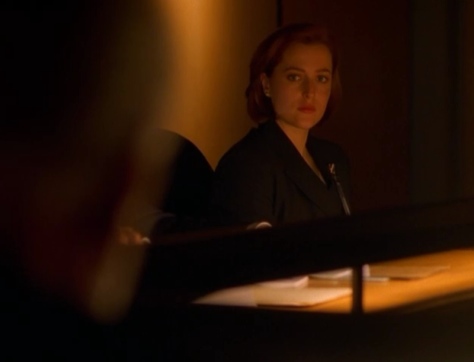
Scully-as-Judas is actually a pretty powerful idea (even if it means you have to briefly consider the thought of Mulder as Jesus), and the episode’s best aspects lie with her. At a Scully family dinner party we finally meet her older brother, Bill. Also we meet the family priest. Both take their time to explain to Scully how she’s doing cancer wrong—Bill thinks she shouldn’t be working, and the priest thinks she should get right with God. Scully disagrees with both, but the conversations allow us to see the doubt in her, flickering. As she tells Bill, Scully believes that her disease is a personal matter. How very Scully of her, and also, how very tragic. We know that she prefers working in order to keep her mind off of the disease, but if it weren’t for her work, she probably wouldn’t have the cancer in the first place. Who’s the Judas now, cancer?
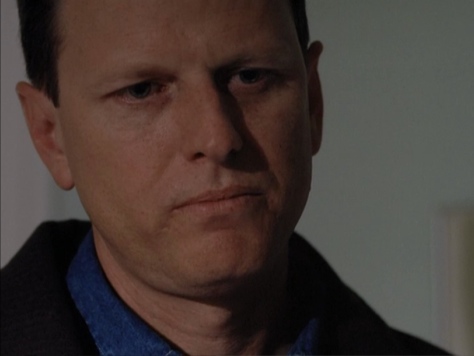
So what can a woman do with these men telling her how to live, except to repress, except to claim it is personal, except to ward off dissenting statements with a thin smile? It’s worked so far, except now Scully has learned that her cancer has metastasized, and the thin smile is turning down. She’s now unable to be a partner to Mulder, or at least the partner she has been. He, not knowing because how could he, comes to her puppy-dog-excited about a man named Arlinsky who claims to have found an alien body, frozen in Canada. He wants her opinion, wants her to test a core sample, but she’s not interested: “Proving to the world the existence of alien life is not my last dying wish,” she snaps.
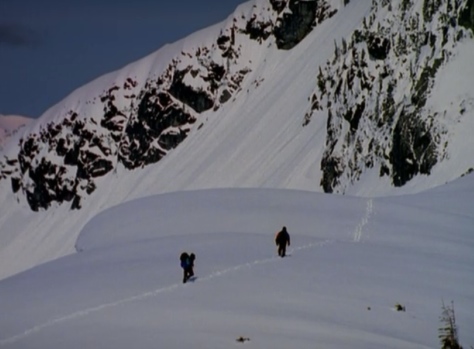
Mulder focuses on the first half of her statement, pointing out that finding alien life Would Change Everything. Scully agrees to look at the core samples, but refuses to go to Canada with him. And whose fault is it, really, that Mulder ignored “dying wish” in favor of “existence of alien life”? It’s easy to say it’s his—he certainly is a man driven sans rest stops—but Scully must share the blame. She says she doesn’t want sympathy, but assuming that your family and friends will have only sympathy for you is a self-fulfilling prophecy. Mulder’s entire career is fueled by a personal quest, so he gets it. He gets it, and so for the most part he’s done exactly what Scully requested of him. He’s ignored the cancer along with her.
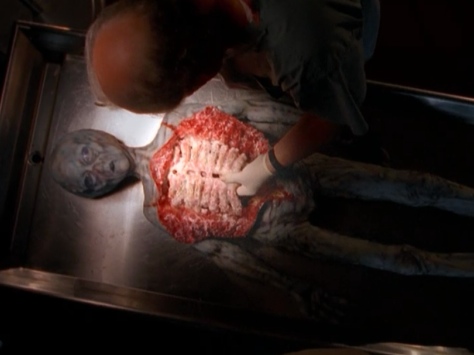
Anyway, so there’s this business in Canada, Mulder goes up there with Arlinsky and finds a whole bunch of dead scientists. All were shot, presumably by someone trying to bury evidence. There’s one survivor, and he hid the alien body, so good job there, and they take the body back to Washington and examine it and everything pretty much checks out, this seems like the real deal. Only meanwhile, Scully has caught a government employee stealing the core sample. His name is Kritschgau and first he pushes her down a flight of stairs and then she chases him with a gun and THEN he tells her that actually he has information about how all of the alien-related X-Files work, including Mulder’s new EBE, is part of a campaign of disinformation.
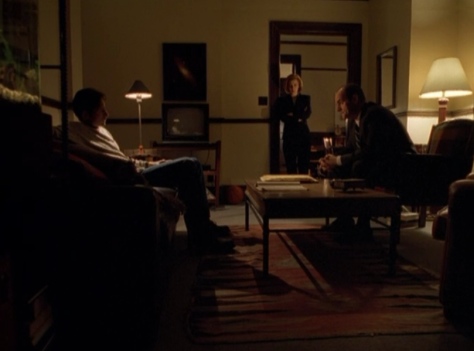
Kritschgau’s story is frankly not that remarkable—he claims to be the guy who ran the Department of Defense’s agitprop for ten years and that’s about it—but Scully is at this point so done with following Mulder to Canada, spiritually, that she is ready to believe him. She brings Mulder to listen to Kritschgau, and the second Mulder leaves the alien autopsy, an assassin busts in, kills Arlinsky, takes the body, and also kills the surviving scientist who-was-also-a-double-agent. By the time Mulder and Scully make it back to the warehouse, everything is gone, and both agents are boiling.
Theoretically. They should be. I mean, structurally, they should be. They have a fight about facts and lies that sounds like many other fights they have had about facts and lies, one that ends when Scully informs Mulder that her cancer was also part of the disinformation campaign. This is where “Gethsemane” fails for me. This season has given Scully has all the anger she needs to resent Mulder’s quest, but Mulder’s arc hasn’t been half as fresh. He’s learned some things about bees, okay, but he hasn’t had a cancer arc of his own, hasn’t really been forced to question the truth of his truth. And yet, that’s what “Gethsemane” wants you to believe, because the next thing we know, Mulder is watching a video of Carl Sagan and crying in his apartment. And killing himself.
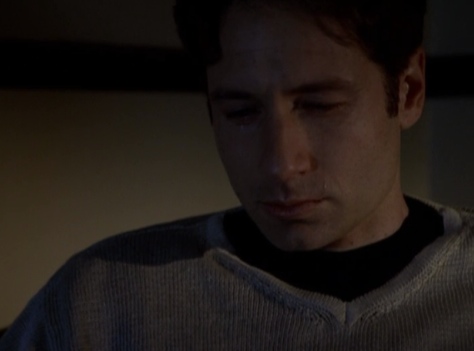
It is hard to watch an episode like this and not resent it, a little, for being smug in itself, for believing that it is pulling the rug out from under you when in fact hardly any of us are even standing on a rug. There’s not enough in here to support the suicide turn, and so, the suicide turn isn’t a successful cliffhanger. We know Mulder’s not dead. Scully in the dark conference room is a red herring, and Season Five will undoubtedly pick up with a reveal of our agents’ cleverness. It’s a shame, it’s a waste, but hey. At least it means that no one here is Jesus.
Meghan Deans gave you this disease to make you believe. She Tumbls and is @meghandrrns.










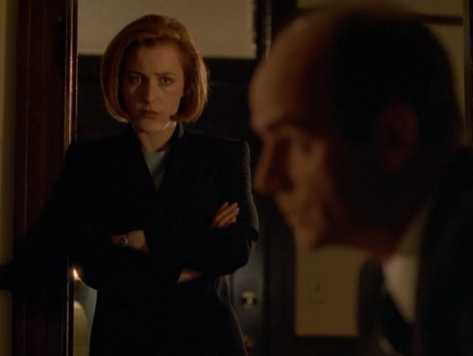
In Christian tradition, Gethsemane is the site of Jesus’s “agony” (or moment of great doubt) where he asks to be relieved of his fate (“Let this cup pass from me”) but ultimately accepts it. And the betrayal here is not Judas, but the other disciples who fall asleep when he asked them to stay awake and keep him company. It is a moment of loneliness and despair, being abandoned by one’s nearest and dearest, then resolving to keep on course. (Perhaps via some of one’s own disinformation?) Soooo, I guess Scully is Jesus.
And, since Judas was a suicide, guess who Mulder is?
That’s a nice read on it, Eugene, I do like that better. Of course, Mulder isn’t really a suicide, so he doesn’t get to be Judas, either. Or maybe everyone’s just taking turns.
This is why I started hating/resenting the mytharc. As a viewer, I get impatient and start to feel toyed with. OH WELL.
I sure do love reading these musings, though!
The biggest cliffhanger was not the apparent suicide (I didn´t really buy it – it was too much like Anasazi for me so the schock effect wasn´t the same second time I guess – and Scully was way too cool about it – there had to be another explanation). The cliffhanger was more Kritschgau´s story – still find it mindboggling when I rewatch nowadays – so that was a whoa!how are they going to continue from that? moment. And then they had the nerve to start s5 with a flashback ep that had nothing to do with this! So frustrating and such good memories of being totally absorbed in the mytharc at this point!
I am looking forward to your take on Redux I & II.
I tend to view this not as a 3-parter but as a 4-parter, with Demons being the first ep. Mulder´s meltdown started before the events of Gethsemane, possibly before Demons, but Demons did help pave the way to this very low point in his s4-5 arc.
Eugene thanks for the extra Biblical info, it was a help to me.
At least it means that no one here is Jesus.
…Yet. Am I misremembering, or was there a later episode that used some pretty heavy-handed Mulder/Jesus/Crucifixion imagery?
I think if this episode fails at all, it’s just not that strong as a cliffhanger. However, I also think it’s the nature of the show to throw us around emotionally, and as soon as we manage to stand up and know what’s going on, throw us down again.
I didn’t believe for a second that Mulder was dead, either, but the emotion Mulder shows at the end is certainly real. The idea that he is personally and (almost) exclusively responsible for Scully about to die is extremely real and terrifying.
I agree with Heidi that this mini-arc started with Demons in its conception, that Mulder was starting to question everything well before this.
I also think dismissing this episode as a non-influence on Mulder, one which doesn’t force him to examine anything, is not giving the episode – or Mulder – enough credit. Imagine thinking that everything you know is a lie. Everything you’ve ever seen, heard, believed, is hot air, and constructed for you. It’s so 1984 and utterly terrifying. It’s simple, to be sure, and the actor who plays Kritchgau I can only see as Pacey Witter’s dad, but in the end it’s still terrifying, and makes me want to watch more.